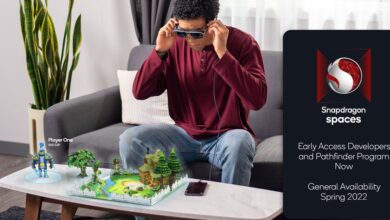The team behind Alto’s Adventure is launching a new app — and studio — aimed at kids

[ad_1]
Snowman is best-known for games like Alto’s Adventure and Skate City, but soon the company will be exploring a very different realm: children’s apps. Today, Snowman announced an upcoming game called Pok Pok Playroom, which will be launching on May 20th on the App Store. It’s a charming, minimalist experience aimed at kids between two and six, designed to encourage open-ended play through a handful of different digital toys. But Pok Pok isn’t just an app, it’s also the name of a brand-new creative studio spun off from Snowman that will be explicitly focused on making these kinds of experiences.
Pok Pok has been in the works for several years. It started life as a side project for Esther Huybreghts and Mathijs Demaeght, who were working as artists at Snowman while also raising two young boys. (The two now serve as creative director and design director of Pok Pok, respectively.) They wanted to find something where they could work together and explore their creativity outside of their day jobs. At the same time, they were coming to grips with raising two children and figuring out how to introduce screentime in a healthy way.
“We wanted him to have some screentime,” Huybreghts says of her youngest child. “When we started looking for an app, we had a high standard of what we wanted. We didn’t want anything addictive, or loud and overstimulating. We couldn’t really find anything that was up to our standards so we decided to build something ourselves.”
:no_upscale()/cdn.vox-cdn.com/uploads/chorus_asset/file/22505269/p.jpeg)
Photo: Pok Pok
They showed it to their co-workers, and it wasn’t long before it became a full-time production and, eventually, the focus of a brand-new studio. “It was immediately interesting,” Snowman creative director Ryan Cash says. Pok Pok Playroom features several different virtual toys, including things like a simple drawing tool and a board full of fun switches and buttons to play with. For the most part, the digital toys are inspired by real-world ones.
“We wanted to bring open-ended play to a device, and most of the toys we liked, in our real playroom, had that same open-endedness to them,” says Huybreghts. Melissa Cash, co-founder and CEO of Pok Pok, adds that “the choice to be inspired by some of these toys was very intentional, because these are timeless toys that have been in our lives for generations. We wanted Pok Pok to have that same feeling of being a timeless toy that grows with your children. They’re designed to reveal more things as your kids become more curious.”
That idea of open-ended play is core to Pok Pok. The games don’t feature high scores or fail states, or many other elements associated with a typical video game. Instead, much like a real-world pile of wood blocks or bucket full of die-cast cars, everything is left up to the player. “The goal starts with the child,” Huybreghts explains. “We don’t tell them what to do. Every game they play is led by them.”
In some ways, Playroom is most interesting for the things it doesn’t have. There are no in-app purchases to worry about — instead, the game will be available through a subscription of $3.99 a month or $29.99 per year, with a 14-day free trial. And the experience has been streamlined so that kids can play with it independently. That means no tutorials or text to trip them up, and a simple and clear UI where it only takes one or two taps to get to different places in the app. “It was a very conscious decision not to have any text, because we wanted an app that was as hands-off as possible,” Huybreghts notes.
:no_upscale()/cdn.vox-cdn.com/uploads/chorus_asset/file/22505274/iPad_RedBG_Town.jpg)
Photo: Pok Pok
The team also worked closely with a range of advisors, including teachers, early childhood educators, and sensory experts from the US, Canada, and Australia who consulted on Playroom. In one instance, for example, signs featuring gibberish text were removed based on feedback from advisors, so that young players wouldn’t get confused while they’re learning to recognize letters. “While we have worked very closely with them, they’ve never come to us with a really big critique, which would’ve been a bad reflection on us,” Huybreghts says.
Pok Pok Playroom launches next week, and the plan is to continue to update it after launch, hence the subscription. That means adding more elements to existing toys, as well as introducing new ones. The goal is to still remain relatively small and accessible even after these expansions. “We don’t want to give kids the Netflix problem, where you’re just scrolling and scrolling and you go to bed because you can’t figure out what to watch,” says Melissa Cash.
Cash notes that “a big part of our work starts when we launch,” as the team hopes to make changes and additions based largely on the feedback from players. But for Huybreghts and Demaeght, the launch of Playroom also marks the end of one unexpected journey. What started as a quest to build an app to keep their own family occupied has turned into a brand-new company and commercial product.
“It was never meant to be a big-budget project like this,” says Huybreghts. “If I had known, I would’ve added eyebrows and noses to the people.”
[ad_2]
Source link





